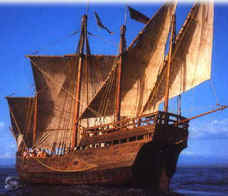European Explorations and New World Beginnings
Before Exploration

One of Columbus's ships, the Nina.
- Technological:
- The largest influence for the Europeans that led to the conquest of the new world was the new ship designs. The first ships that were able to cross the ocean were called Caravels. They had triangular sails that made it easier to sail into the wind, smooth holes for greater speed, rutters for improved steering and raised front/rear decks for more space. Navigational instruments had greatly improved also, so they would sail in the adequate direction. This included the astrolabe to find latitude, the lead and line for depth and floor content and time and a compass to find the polar north.
Economic:
* The spices of Asia, animal furs, gems and silver were key things the Europeans needed to find. Gold was the most important thing that they wanted. Another change is when the reformation began.
Political:
*Henry, a Portuguese prince, began a school for navigation. He paid people money for sailing expeditions to explore the Atlantic and the west coast of Africa.
- The ''Hundred Years War'' was a major conflict between the English and the French, which lasted for one hundred years. When the French and English engaged in it until 1453, the English won many battles, but the French came out victorious in the end.
- The Renaissance (a cultural movement that spanned roughly the 14th to the 17th century, beginning in Florence in the Late Middle Ages and later spreading to the rest of Europe).begins and lasts until about 1800.
- The famous black death (which was caused by the bacteria ''Yersinia pestis' ) and famine occurred.
